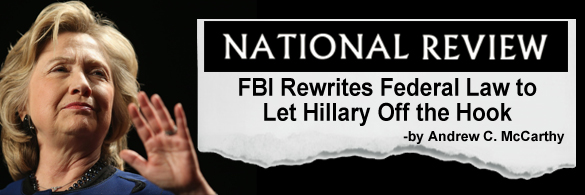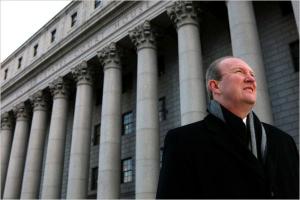RUSH: Good. Now, okay we got the second day here. You’ve had a day — we’ve all had a day — to digest this. You had your piece at NRO yesterday that basically shredded the FBI director’s claim that he couldn’t find any intent here and, as such, no reasonable prosecutor would seek charges or would seek to prosecute the case. Where are you today after having an overnight to digest this, talk to people about it, and review your own thoughts?
 MCCARTHY: Well, I guess, because I think highly of Jim Comey — he’s been a friend of mine and someone I have a lot of respect for personally for a long time — I try to find some silver linings in what otherwise is a pretty disappointing outcome. And the one that I keep coming back to, Rush, is that the normal way that this exchange between the FBI and the Justice Department goes is it happens, really, in secret, in private, and we never hear about it. And when a case basically gets tanked or not brought, you never know what the evidence in the case was.
MCCARTHY: Well, I guess, because I think highly of Jim Comey — he’s been a friend of mine and someone I have a lot of respect for personally for a long time — I try to find some silver linings in what otherwise is a pretty disappointing outcome. And the one that I keep coming back to, Rush, is that the normal way that this exchange between the FBI and the Justice Department goes is it happens, really, in secret, in private, and we never hear about it. And when a case basically gets tanked or not brought, you never know what the evidence in the case was.
And the only upside I can see to what’s happened here is he — in a very expansive, lavish way — laid out exactly what the FBI’s investigation found so that at least the American people will have that before them when they go to the polls in November. Now, I should underscore that I don’t think that’s the FBI’s job. I like the idea that the law enforcement people do law enforcement and leave the politics to the politicians. But I am grateful for the fact that at least we have a full accounting of what they found.
RUSH: You know Comey, so in that regard let me ask you: An analogy made here yesterday that others have made also is that this was strikingly similar to the Chief Justice John Roberts saying (summarized), “You know what? I don’t feel comfortable finding a major piece of legislation of the president’s that was voted in favor by the people’s representatives… I just don’t want… I’m not gonna rule this unconstitutional.” So he changes it from the bench essentially to make it pass muster. And some people are saying that Comey has, in his own way, done the same thing here, that he just couldn’t bring himself to have such a major impact on something as important as a presidential campaign by taking an action that might result in the nominee of one of the major parties being taken out. Any reaction to that theory?
 MCCARTHY: Yeah. I like the comparison for a few reasons. I think, you know, one of the reasons that Chief Justice Roberts did in that opinion, very much like what Jim did yesterday, is with Tom Brady-like precision he moved down the field briskly and in a way that looked like he couldn’t be stopped. And then once he got to the Red Zone, he moved the goal post, he moved the end zone, he changed the rules that would have otherwise led him to a different conclusion. So it’s an interesting comparison.
MCCARTHY: Yeah. I like the comparison for a few reasons. I think, you know, one of the reasons that Chief Justice Roberts did in that opinion, very much like what Jim did yesterday, is with Tom Brady-like precision he moved down the field briskly and in a way that looked like he couldn’t be stopped. And then once he got to the Red Zone, he moved the goal post, he moved the end zone, he changed the rules that would have otherwise led him to a different conclusion. So it’s an interesting comparison.
The other thing is, there are a lot of people like myself who were very disappointed in Roberts, just like I was disappointed in Comey, whereas there were other people in the Roberts rah-rah section who said that the chief justice was a diabolical genius, because while he seems to have come up short of doing what he should have done in this particular case, he sowed the seeds for undermining the jurisprudence of the Commerce Clause and therefore all of this federal expansion is potentially vulnerable to attack. I hate that kind of stuff. I just think it’s too Machiavellian to me. I want the judges to judge cases —
RUSH: Exactly.
MCCARTHY — I want the prosecutors to prosecute their cases, and I want the FBI to find facts, apply the law, and do the right thing in a case.
RUSH: Right. It’s akin to the theory somewhat related, that people say, “Go ahead, let the Democrats win the election so people will find out how bad they are! Go ahead, make Obamacare constitutional so people will learn how bad government expansion and intrusion is.” It never works out.
MCCARTHY: No. And we’ve got it already, you know? (chuckling) How many more times do we need to do it? You know, message received!
RUSH: Well, but look in these two cases. I find this interesting. I hope I’m gonna be able to find the right words here to phrase the question here, but you have praised Comey’s integrity — you know him personally — and everybody the same thing about John Roberts. So here we have two people that arguably if you had to peg them ideologically would be on the right side of center and both reputed to be of great integrity and highly reputed. And both of them exercised restraint. They did not go where they could go.
They could not go where the law fully permitted them to go in order to cause less havoc, wreak less havoc on the country — on the body politic — thinking they were doing the right thing for the stability of the country. Now, the left never does that, Andy. If they’ve got a chance to take us out legally or illegal, they do it. We don’t seem to be able to close the deal. When we’ve got ’em in the jaws of defeat, we don’t seem to be able to clamp done and send the ’em packing. We practice restraint.
We practice fairness. We show that we have maturity and an understanding of everything going on, and we hope people see us in that way. And it just never works out. So we’re in a fight for the life and death of the country, and they… I’m really nervous about this. Even though I knew this was gonna happen and I didn’t think she was gonna be indicted, I’m still devastated by this because of the implications for the country and what it means, particularly if she goes on to win.
 MCCARTHY: Yeah, Rush, I think you should be for a couple of reasons. You know, number one, I’ve never understood this idea that, you know, we have to have the election calendar in mind when we’re doing these political corruption cases because we wouldn’t want to do anything that would make the FBI responsible for the outcome of the election. Well, you know, look, if you’re in these jobs — and I’ve been in these jobs — you have two choices.
MCCARTHY: Yeah, Rush, I think you should be for a couple of reasons. You know, number one, I’ve never understood this idea that, you know, we have to have the election calendar in mind when we’re doing these political corruption cases because we wouldn’t want to do anything that would make the FBI responsible for the outcome of the election. Well, you know, look, if you’re in these jobs — and I’ve been in these jobs — you have two choices.
You either indict someone who deserves to be indicted and affect the election that way or you don’t indict someone who deserves to be indicted, and you affect the election that way. One way or the other, you are in the situation where you’re affecting the election. So that ought to be liberating. We shouldn’t be worried at all about how our exercise of discretion affects the politics. What our job is, is to exercise discretion correctly and let the chips fall where they may. But, secondly, we are never going to impress the audience that they seem to want to impress.
I think you pointed out earlier that, you know, half of this country is going to vote for Hillary Clinton no matter what, and the reason they’re going to vote for Hillary Clinton is not that they’re under any illusions about who she is character-wise. It’s because they see her as the way to defeat Republicans and defeat conservatives and block us from being in power, and to them that’s more important than what her character shows.
RUSH: I don’t think there’s any question about it. There’s glee… I mean, they’ll sing her praises just short of… I mean, even if she’d been indicted, I think she would have circled the wagons around her. Well, okay, so there’s no legal future here. There’s no… She’s exonerated. Well, no! Actually, she’s not. She’s not been cleared. That’s another thing. She’s not been cleared; she’s not been exonerated. They just made the decision not to pursue this, so she is still susceptible — you alluded to this at the beginning here — to the court of public opinion. Are you confident — do you have any confidence at all — that a case can be made in the political campaign that would accomplish the same thing, barring legal penalties, of course —
MCCARTHY: Yeah.
RUSH: — that an indictment might have?
 MCCARTHY: I think, Rush, that it’s gonna take more than, you know, just saying the system is rigged. And I — you know, I know that that’s been an effective argument for Trump, but I think most of the people who are buying that are already in his camp. It’s gonna require more in the way of carefully going through what the FBI has found, and showing in a way that that thing that you played before showed that Comey really didn’t show yesterday, which is how appalling the differences between what the FBI found and what she represented to the American people throughout this campaign. I hope they’re up to that, because I think there is a way that that can resonate with the public.
MCCARTHY: I think, Rush, that it’s gonna take more than, you know, just saying the system is rigged. And I — you know, I know that that’s been an effective argument for Trump, but I think most of the people who are buying that are already in his camp. It’s gonna require more in the way of carefully going through what the FBI has found, and showing in a way that that thing that you played before showed that Comey really didn’t show yesterday, which is how appalling the differences between what the FBI found and what she represented to the American people throughout this campaign. I hope they’re up to that, because I think there is a way that that can resonate with the public.
RUSH: Explain to me, if you would — and to the audience, too, before you go here — you made it very clear in your article yesterday that Comey essentially had to combine two statutes. One statute that did not require intent, he changed. He rewrote the law in order to make intent relevant and then to say she never showed any. Well, you know, you and I never intend to do any of this stuff that’s illegal that we do or any of the questionable things like your example to me. “You know, we text when we drive. That’s negligent.” We know we’re being negligent, but we don’t intend to have an accident because of it, yet we still engage in it.
MCCARTHY: Right.
RUSH: And it’s against the law. So she was given a pass. She was given a pass not only on intent; she was given a pass on negligence. She was given a pass on relentlessly, and she seeks the highest office in the land. It clearly it looks like there’s two sets of laws for two different classes of people here.
CALLER: You’re exactly right. If you apply the law that applied to her, she was reckless in the sense of being grossly negligent, which is what the statute talks about. Now, the reason this is confusing to people is that in most criminal cases there’s an intent requirement where you have to specifically intend the thing that causes the harm. In a case involving recklessness with gross negligence, you often intend to do the thing that is the negligent thing to do, like when we text and we know we shouldn’t.
We know in our minds that when we do that we cause injury to ourselves and anyone who’s in our car in the car. We don’t intend that those people be injured, but we certainly intended to do the texting, and that was grossly negligent. What she did here, she had every reason to know — as Comey pointed out to a fair-thee-well yesterday — that her behavior, setting up this systematic nonsecure system to have these highly classified communications, she perfectly well knew that that was creating a major vulnerability for our national security.
Now, did she want our national security to be hurt? No, but (chuckles), you know, obviously she engaged in behavior that ran that risk. And it’s absolutely clear. I wish he had gone more yesterday into the damage assessment that the intelligence community has had to do on the basis of what she leaked out by communicating on this non-secure system.
RUSH: I have one more question but I’ve gotta take a break. It’s on intent. Can you spare five more minutes?
MCCARTHY: Yeah, of course. Sure.
RUSH: Andy McCarthy is with us from National Review Online and PJ Media. We’ll be back here in just a second, folks. Don’t go away.
BREAK TRANSCRIPT
RUSH: And we are back with Andy McCarthy with a long and deep resume, including time in the US attorney’s office the Southern district of Manhattan when Rudy Giuliani was the US attorney, which means Rudy was Andy’s boss. Rudy’s been pretty pointed. Rudy thinks that she shouldn’t get a security clearance now, that had he been Comey, had he been the US attorney, he would have indicted her. And he says that if Trump wins, he could appoint an attorney general who could still indict Hillary. Is that true?
MCCARTHY: It’s absolutely true, and it will never happen, but this Justice Department could indict her. The recommendation is just that; it’s a recommendation. It’s not the decision.
RUSH: On intent, this is a little bit of my ignorance on the law. For some reason I’ve been confused. I thought intent was a matter for the jury to decide in cases. I didn’t know that intent became such a big factor in the decision to charge.
MCCARTHY: Well, every case, Rush, when you make a decision whether to charge or not involves weighing every, what we call essential element of the crime. That is, every criminal offense has three or four or five elements that you have to prove beyond a reasonable doubt to bring the case. So if you’re gonna assess the strength of your evidence, one of the things you always have to evaluate is the intent requirement of the statute, which varies from statute to statute. Sometimes it’s intent, like intentional action. Sometimes it’s willfulness, and sometimes, very unusually in the criminal law, it’s gross negligence as it is with this particular statute involving national security.
RUSH: Well, gross negligence cannot possibly have intent because it cancels it out. If you’re grossly negligent, intent’s not a factor, you are or you aren’t, and she clearly was.
 MCCARTHY: Yeah, I think what we’ve hit on is what your confusion is, and I’m not clearly enough explaining it. We use intent among prosecutors and agents as shorthand for what we should call mens rea or the mental element of a crime. Sometimes it’s intentionality, which means, you know, you intended when you pointed the gun to shoot that victim. Sometimes it’s willfulness, which means a kind of an evil mind-set, and sometimes it’s gross negligence, as it was in this case.
MCCARTHY: Yeah, I think what we’ve hit on is what your confusion is, and I’m not clearly enough explaining it. We use intent among prosecutors and agents as shorthand for what we should call mens rea or the mental element of a crime. Sometimes it’s intentionality, which means, you know, you intended when you pointed the gun to shoot that victim. Sometimes it’s willfulness, which means a kind of an evil mind-set, and sometimes it’s gross negligence, as it was in this case.
RUSH: Okay, 90 seconds. One other thing. I’ve seen that she tossed her State Department — her calendar, schedule, that she got rid of a number of things like this, burned ’em, threw them away, they’re gone. Was that part of this investigation that’s now concluding? That’s not part of something else, she gets away with that, too? She gets away with destroying all the evidence, her calendar, her schedule, who she met with, that’s all gone, too, right?
MCCARTHY: Yeah, according to what the FBI director said yesterday, what they were looking at here was the question about handling classified information. We had heard some reports that they were also looking at the Clinton Foundation and the shenanigans that went on there where I think those calendars would be more relevant. He didn’t mention a word about that yesterday. I don’t know if that means that that’s off their radar or he just didn’t want to discuss it yesterday.
RUSH: And do you think the meeting — 30 seconds — Loretta Lynch and Bill Clinton had any effect on Comey’s decision making and timing?
MCCARTHY: No. I don’t think that would have affected it, but you know, I do think that the fact that President Obama, in his assessment of it, talked about intentionality as opposed to, you know, carelessness and did kind of the same thing Jim did yesterday in terms of —
RUSH: Right.
MCCARTHY: — laying this —
RUSH: “She never did anything wrong. She never intended to do anything.” Yeah. Okay. Andy, I appreciate the time. I really do. Andy McCarthy, who you can find at National Review Online frequently and PJ Media and well worth your time to do so.
BREAK TRANSCRIPT
RUSH: When we had Andy McCarthy on a couple of hours ago on the program, I mentioned that his former boss, Rudy Giuliani, had said some powerful things about this whole situation with the FBI, James Comey, Hillary Clinton and the email server. We have a couple of bites here. First from Fox yesterday, The Real Story, Kimberly Guilfoyle was talking to Rudy, and she said, “Director Comey’s decided not to, in fact saying no reasonable prosecutor would recommend that this case go forward against Hillary Clinton. What are your thoughts, Mr. Giuliani?”
GIULIANI: My thoughts are that it would be unreasonable for a prosecutor not to go forward with it and almost an abdication of duty. It does not require intent. It just requires gross negligence. He said during his long statement that she was extremely careless. The first definition of gross negligence that comes up when you take out the legal dictionary is being extremely careless. The minute you say someone is extremely careless you are saying they’re grossly negligent.
RUSH: Right, and there’s no intent required. Grossly negligent obviates the whole notion of intent. And what is this notion of intent anyway? Well, she didn’t intend to put the US at risk. She didn’t intend to have her system set up in such a way that could be hacked. She didn’t intend for the top secret documents that she was sending and receiving to be seen by anybody else.
You try that. You know, the next time you’re guilty of anything, the next time you’re charged with anything, try saying, “Hey, hey, hey, I didn’t mean to run the stop sign.” Or, “I didn’t mean to leave the bar and get behind the wheel. I really didn’t. I didn’t mean to get behind the wheel after having some adult beverages.” See if that works for you. And if you’re saying it’s not the same thing, yes, it is. In fact, it’s even worse. Giuliani wasn’t finished. He continued with this.
GIULIANI: That’s what Jim Comey found. He then just didn’t come to the conclusion that it’s a violation of the statute. He came to the other conclusion. I think that’s why he walked out. There’s no way to square the two things.
GUILFOYLE: Isn’t that interesting, ’cause he was potentially going to take questions, and he left.
GIULIANI: That’s the first question that would have been asked. The second question would have been, would she pass an FBI background check for top security clearance? The answer is no. She couldn’t possibly. I’ve read a thousand FBI background checks, maybe 2,000. This would get thrown right in the ash can. I mean, she wouldn’t be, you know, the number 35 person at the State Department. If you took his report and an FBI background check, she couldn’t get any kind of sensitive job with the government of the United States.
RUSH: Well, now, wait a minute. Does that mean she can’t be president? This is serious. If you can’t pass a background check, can you be president? I know, I know nothing’s gonna come of it. That’s the whole point. It should! This is serious stuff.



